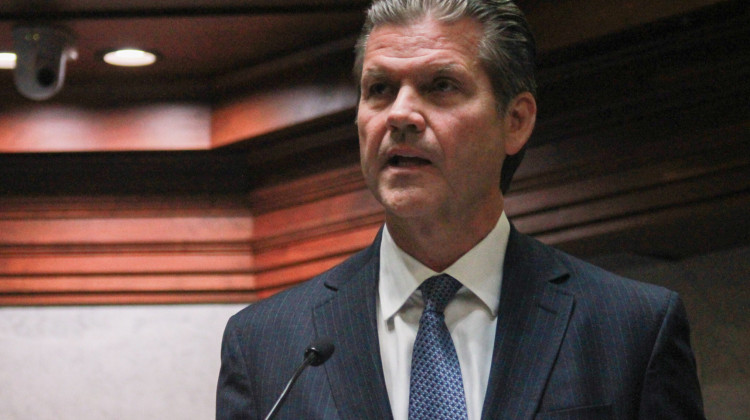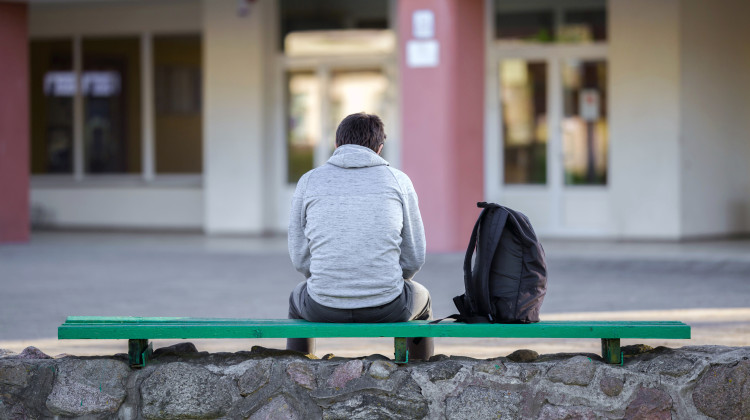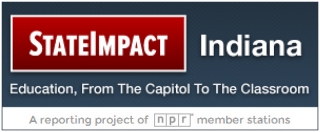
Reagan Roush, center, makes a creamy chicken fajita pasta dish at a weekly cooking skills class at the College Internship Program in Bloomington, Indiana.
Peter Balonon-Rosen/IPBReagan Roush likes things spicy.
“When I make Mexican ground beef, I add an onion and a green pepper and three habanero peppers,” Roush says, with a smile. “And yes, it is hot.”
For Roush, who is diagnosed with autism spectrum disorder, cooking is more than just the steps to a tasty meal. To him, it’s a sign he’s moving toward his ultimate goal: independence.
Like peers throughout the country, Roush, a sophomore at Indiana University, is a member of the first generation of college students with a widespread autism diagnosis reaching campuses. The growing numbers of students with autism on campuses reflect a change in the way doctors began to look at autism in the 1990s. Awareness spread, diagnoses increased, and school services emerged to include these students in mainstream classrooms.
At Indiana University, in the past decade, the number of students self-identifying as having autism has increased tenfold. In spring 2008, five students registered with the school for academic accommodations related to autism. Today, that number exceeds 50 students.
As a result, the university has found a partner in the College Internship Program. The program doesn’t give students college credit. Instead, it’s designed specifically to help students with autism navigate college life. It costs roughly the same amount as Harvard University.
CIP classes including peer mentoring, executive functioning skills and, of course, cooking.
On a recent Tuesday evening, Roush and two classmates worked hard to make a creamy chicken fajita pasta at a weekly cooking skills class in CIP’s kitchen.
“I never really cooked before moving down here,” Roush says. “It’s another step towards reaching full independence.”
At the start, Roush wasn’t sure how he’d fare in college life.
“When I got that acceptance letter, what came through my head was, ‘Am I really going to be able to do this?’,” Roush says. “‘This is going to be very different.’”
CIP provides classes and a residential option for students in nearby apartments.
“I first moved into CIP around two weeks after my first day at IU,” Roush says. “And I initially needed a ton of help from the staff.”
Roush says he needed help meeting professors, asking for academic accommodations and cooking basic things. Today, he says, he’s much more independent, but navigating college life can still be a challenge.
“The biggest challenge about being on such a big campus, is probably making friends,” Roush says. “I’m in a much different situation than most of my peers … It’s kind of hard to relate with them.”
He says for someone with autism, the social side of college life is the most intimidating. But Roush says it won’t defeat him.
“You can overcome your limits, but you’ll have autism throughout your life,” Roush says. “But you can still, you can still become a champion of it. You can still win.”
Across town, Marci Wheeler works at the Indiana Resource Center for Autism at Indiana University. Wheeler, a social worker, oversees Indiana University’s Students on the Spectrum Club, a social group for students with autism.
“The social life for college students can be something that anybody deals with,” says Wheeler. “You just kind of magnify that for someone on the autism spectrum.”
On Indiana University’s campus of 40,000 students, the university knows of about 50 students self-identifying as having autism by asking for academic accommodations.
But autism can manifest in ways that don’t affect students academically, Wheeler says. Just socially.
“There are definitely people on campus that are not being counted in the numbers,” Wheeler says.
Today, one in 68 children are diagnosed with autism. And when students get to college, they can choose whether they wish to disclose that.
Indiana University offers services to help students with autism adjust to the new routines, pressures and challenges of college life. The university provides counseling and psychological services through the health center and the Students on the Spectrum social group.
Wheeler hopes to see more spaces for the students with autism.
“People are realizing these folks are coming to colleges and so things need to change to welcome and understand them better,” Wheeler says.
And some students with autism want to make that change happen. On a recent Friday evening, the Helene G. Simon Hillel Center on Indiana University campus is abuzz.
“What we are going to be doing tonight is something pretty historic,” says Abe Shapiro, a freshman. “What we we are doing is ‘autism awareness Shabbat night.’”
Ahead of a welcome to the gathered congregation of about 50 people – some with autism, others without – Shapiro is a little nervous. Clad in a blue and black button-down shirt, a pair of blue jeans and glasses he walks through the crowd.
Tonight, he’s hosting the event.
“I’m feeling pretty good, a little nervous, but I think this is going to go off without a hitch,” Shaprio says.
At age 3, Shaprio was diagnosed with aspergers and autism spectrum disorder.
“I feel that this is not only important to me but my fellow spectrum-ites, if you will,” Shapiro says. “When I was younger I wouldn’t speak with people, and I’d ramble on and on about topics, something I still do, of course.”
Today, he says, he embraces it as a positive thing, not a negative one. For instance, he’s memorized all of the Major League Baseball World Series champions from 1903 to 2016 – and he’s proud of it.
“From the Boston Americans beating the Pirates, to the Chicago Cubs beating the Cleveland Indians,” Shapiro says, with a laugh.
Soon the service, a traditional Jewish Shabbat, begins. The service includes speeches about autism awareness and wraps with a hearty “Shabbat shalom” from the congregation. Shapiro is elated.
“In one word, the way I feel about tonight is ecstatic,” Shapiro says. “I feel that it went perfectly and that we really brought awareness to an issue that’s been ignored for a very long time.”
Jacky Harner, a CIP student, approaches Shaprio.
“That was cool,” Harner says. “That was a really cool service, I enjoyed it.”
And for Shapiro, that means a lot.
“Each of those students deserves a place in our society and they don’t deserve to be ridiculed and categorized for something they can’t control,” Shapiro says. “Rather the world should embrace them as one of their own.”
Shapiro hopes to go to law school one day to defend people who aren’t getting their individual education rights. But on this Friday night, he has more immediate plans.
“I’m about to go get hopped up on some matzah ball soup right about now,” Shapiro says, with a chuckle. “Off to dinner!”
 DONATE
DONATE








 Support WFYI. We can't do it without you.
Support WFYI. We can't do it without you.